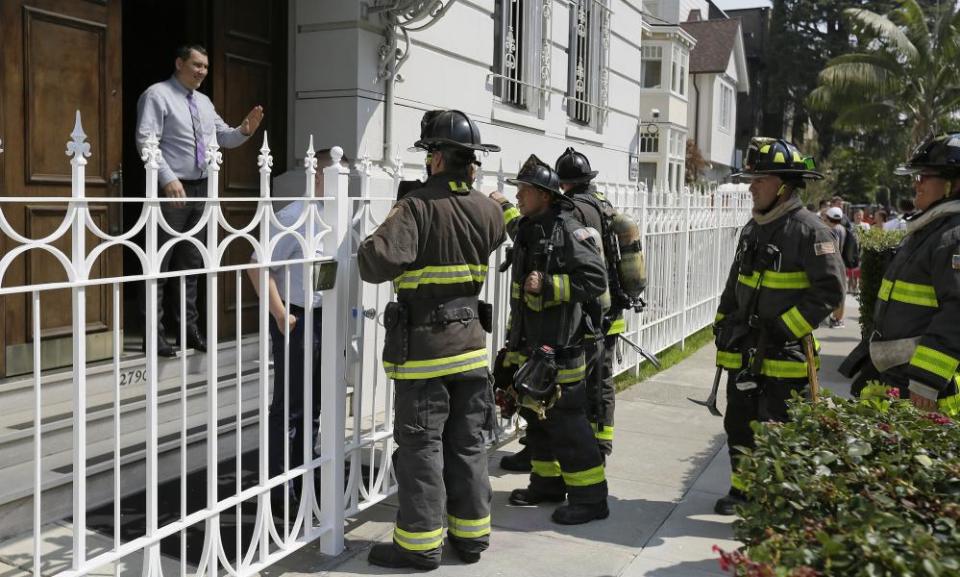Russia says US threatened to break into trade mission
Fires at Washington mission and San Francisco consulate, both ordered to close by the US, prompt speculation Russians were burning documents

Russia’s foreign ministry has summoned a senior US diplomat in Moscow to hand him a note of protest over alleged plans to conduct searches in the trade mission complex in Washington, the ministry said in a statement claiming the United States had threatened to “break down the entrance door”.
The ministry said the protest note handed to Anthony Godfrey, deputy chief of mission, described the planned “illegal inspection” of Russian diplomatic housing as an “unprecedented aggressive action” that could be used by the US special services for “anti-Russian provocations” by the way of “planting compromised items”.
The Washington office is one of three Russian facilities the US ordered closed this week, in the latest round of punitive measures between the two countries that began at the end of last year. The others are the San Francisco consulate and a New York trade office.
Signs that staff may have been burning documents at the Russian diplomatic mission in Washington were reported late Friday evening, just a day after Donald Trump ordered them closed in a tit-for-tat with Moscow over the ousting hundreds of US diplomatic personnel.
The publication Foreign Policy reported that staff at the Trade Representative of the Russian Federation in Washington DC were seen dumping paper into the fire.
EXCLUSIVE: Here's the fire in back of about to-be-closed DC Russia trade rep building. @janawinter on the scene. pic.twitter.com/oKoKX2OIBv
— Foreign Policy (@ForeignPolicy) September 1, 2017
That report followed an incident earlier in the day when dark smoke could be seen pouring from a chimney on the Russian consulate in San Francisco. San Francisco firefighters called to the consulate were turned away by officials.
The Associated Press reported that consular staff told firefighters that there was no problem; they were burning unidentified items in a fireplace. Consul Sergey Petrov declined to comment about what was being burned inside.
Mindy Talmadge, a spokeswoman from the San Francisco fire department, said she did not know what they were burning on a day when temperatures in San Francisco climbed to 95 degrees by noon.
“It was not unintentional,” she said.
The consulate had been given a Saturday deadline to close Russia’s oldest consulate in the US amid escalating tensions. The Russian foreign ministry spokeswoman Maria Zakharova said US “special services” intended to search the consulate Saturday along with several apartments used by Russian diplomats and their families.
The San Francisco consulate is well known as a base for technology workers and has been long suspected of involvement in spying activities.
“There is finally the realization by the administration that Russians have been involved in intelligence operations at this consulate, which they have been doing for decades,” Rick Smith, a veteran FBI special agent who previously headed the bureau’s Russian counterintelligence squad in San Francisco, told AP.
“It’s almost 50 years of history and part of a tit-for-tat, but this is more like a hammer.”
A state department spokeswoman said on Thursday that the Russian properties were being shuttered “in the spirit of parity”.
“With this action both countries will remain with three consulates each,” spokeswoman Heather Nauert said. “While there will continue to be a disparity in the number of diplomatic and consular annexes, we have chosen to allow the Russian Government to maintain some of its annexes in an effort to arrest the downward spiral in our relationship.”
But the Russian consulate claimed the closure of the San Francisco consulate would hurt both Russian and American citizens needing its services. The consulate issued more than 16,000 tourist visas to American citizens last year, it said via Facebook.
The latest retaliatory closure of Russian-held properties is the second in less than a year. In January, Barack Obama ordered the closure of two embassy properties in Washington and New York in response to reported Russian meddling in the 2016 presidential election.
The administration described Russia’s involvement as “Significant Malicious Cyber-Enabled Activities” and sanctioned four Russian individuals and five Russian entities for what it said was election interference.
The administration also also ordered 35 Russian diplomats to leave the country.
“Russia’s cyberactivities were intended to influence the election, erode faith in US democratic institutions, sow doubt about the integrity of our electoral process, and undermine confidence in the institutions of the US government,” a White House statement said. “These actions are unacceptable and will not be tolerated.”
In late July, Vladimir Putin ordered the expulsion of 755 US diplomats by 1 September and seizing of two US properties. The Kremlin also said it would cap the number of US diplomats allowed in the country at 455.

